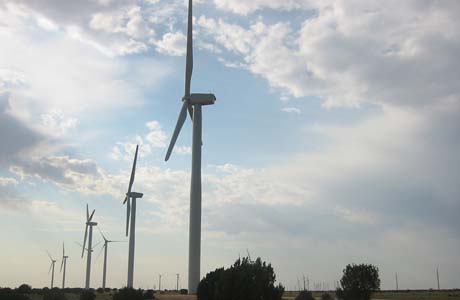

Hydro awash in independent green power bids
By Scott Simpson
Vancouver Sun
November 29, 2008
 Independent power producers receive green bids, including for wind-generated power. (Xantrex handout) Independent power producers receive green bids, including for wind-generated power. (Xantrex handout) |
Independent power producers are offering BC Hydro enough power in response to a new green-energy call to light every home in the province -- at least on paper.
Hydro reported Friday that it has received proposals for 17,000 gigawatt hours of electricity -- primarily small hydro and wind -- in response to its clean call, which closed this week.
That's equivalent to a third of Hydro's annual output -- the amount of power consumed each year by the Crown corporation's residential customers.
Preliminary tallies from the call, which closed Tuesday, show Hydro received bids from 43 proponents for a total of 68 projects.
It's the biggest amount of electricity ever bid to Hydro by the independents, and it includes several comparatively large-scale projects, including an offshore wind farm and a 17-stream run-of-river hydro network in Bute Inlet.
In total, there are 45 small hydro projects and 19 wind projects, with each sector offering more than 8,000 gigawatt hours.
The remaining four proposals include two for waste heat, one biogas and one biomass project.
Hydro intends to accept only 5,000 gigawatt hours. Hydro is mandated by the province to make B.C. electricity self-sufficient by 2016 -- but plans include conservation measures to cut consumption and enhancements to its network of large-scale heritage assets.
The Independent Power Producers Association of B.C. has speculated that bidders will be pricing their electricity at an average price above $90 per megawatt -- slightly more than Hydro's cost for delivered power from its own, newly refurbished Aberfeldie generating station.
However, Hydro executive vice-president Bev Van Ruyven noted that the clean call did not require fixed-price bids, leaving room for Hydro to dicker for the lowest possible prices on the bids it eventually accepts.
"We think it can help us gain additional value for our ratepayers," she said.
Van Ruyven described the large volume of bids as "a really robust response to a competitive process."
Van Ruyven hopes the fact that not all bids will be accepted "will make everybody sharpen their pencils knowing that they are in with a whole bunch of people, and that we are not going to be awarding 68 contracts."
Attrition rates on past calls have run at about a third of accepted bids, and Hydro will build in a 30-per-cent attrition rate on this call as well.
Hydro did not identify bidders, but some have come forward on their own.
Donald McInnes, CEO of Plutonic Power, suspects his company will emerge as the single largest bidder with roughly 3,500 gigawatt hours of total power -- including three run-of-river facilities in Toba Inlet, and 17 in Bute Inlet.
McInnes believes projects offering large accumulations of power will win Hydro's favor.
"There are 35 run-of-river plants operating today, and the average size of those is only 10 megawatts. If the goal is self-sufficiency by 2016, there is no way way for the utility to get there 10 megawatts at a time," McInnes said in an interview.
NaiKun Wind Energy Group has bid 396 megawatts of wind power, enough to light 130,000 homes, via offshore projects east of the Queen Charlotte Islands
Offshore wind turbines are more costly to install, but NaiKun president and CEO Paul Taylor expects less competition for space on B.C.'s constrained transmission grid because most wind projects are landlocked in the northeastern corner of the province.
"There is no shortage of quality generation available for the province to develop over the next decade or so. I think the real challenge is going to be the transmission system rather than the sources and type of generation that's available," Taylor said in an interview.
"Cost is one factor but pure access is the other. Our project has very few constraints plugging into the system."
He said NaiKun is not interested in direct exports of electricity and sees BC Hydro, not a foreign buyer, as its sole customer.
Finavera Renewables announced earlier this week a memorandum of understanding with GE Energy Financial Services for financing of up to 295 megawatts of wind power in the northeast. Projected cost of the projects is $800 million.
Finavera CEO Jason Bak believes secure funding is a competitive advantage.
"People are still submitting bids. But the lack of financing available in the market, we think, weighs things more towards our end of the spectrum -- mature projects with major companies and big balance sheets. I think that's going to be a strong differentiator for Hydro."
ssimpson@vancouversun.com
© Copyright (c) The Vancouver Sun
Posted by Arthur Caldicott on 30 Nov 2008